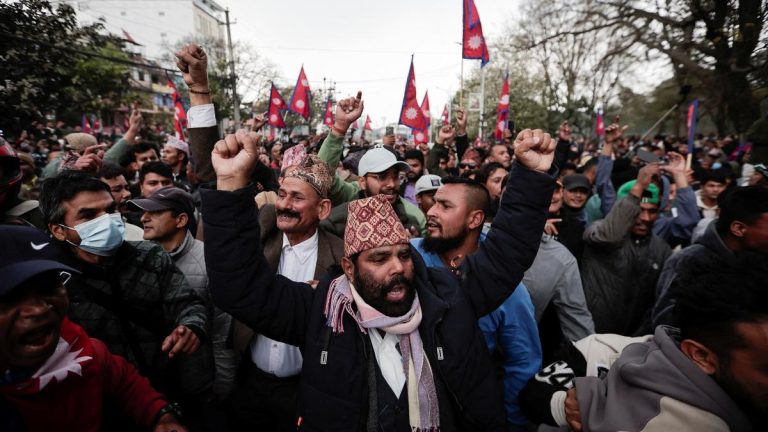Nearly two decades after Nepal became a secular republic, thousands of people are once again calling for the return of the monarchy. Public protests have surged in recent months as frustration over economic hardship, rising prices, and political instability spreads across the country. Last month, a royalist rally turned deadly, leaving two people dead and over 100 arrested. Protesters say they want the king back—not to rule—but to serve as a national guardian.
Growing Support for the Monarchy
Royalist demonstrations are gaining momentum in Nepal. Many people are disappointed with the current leaders, blaming them for rising unemployment, inflation, poor public services, and frequent political changes.
Rajendra Lingden, chairperson of the royalist Rastriya Prajatantra Party (RPP), said,“We do not seek monarchy as a ruling institution, but rather as a guardian that safeguards national interests and prevents foreign interference.”
The RPP, Nepal’s fifth-largest political party, won 14 parliamentary seats in the 2022 general election—up from just one in 2017. Their growing support reflects the rising appeal of pro-monarchy and pro-Hindu values among voters.
Voices from the Streets
Many people feel that the country has taken a wrong turn since abolishing the monarchy in 2008.
“The country faces instability, prices are high, people are jobless, and there is a lack of education and healthcare facilities,” said Rajindra Kunwar, a 43-year-old teacher who joined last month’s protest. “That’s why we need the king back.”
Protesters at the rally chanted slogans like “Come king, save the nation,” while waving national flags. The former monarch’s public appearances have drawn large crowds in recent weeks.
Background: End of a 240-Year Monarchy
Nepal was a monarchy for over 240 years. That ended in 2008, after a peace deal ended a decade-long civil war that killed more than 16,000 people. The war had pitted Maoist rebels against the state and the monarchy.
In 2001, King Gyanendra Bir Bikram Shah took the throne after a palace massacre wiped out most of the royal family, including his brother King Birendra. During his rule, Gyanendra suspended the constitution and dissolved Parliament in 2005, triggering mass protests.
In 2008, Parliament voted to abolish the monarchy, declaring Nepal a secular republic. Gyanendra left the palace, saying he respected the people’s decision. Though many celebrated the end of royal rule, some mourned the fall of the monarchy.
Divided Opinions in Modern Nepal
Mainstream politicians remain opposed to bringing back the monarchy.
“Monarchy is a failed and outdated concept,” said Rajaram Bartaula, chief whip of the Communist Party of Nepal (Unified Marxist-Leninist).“Conscious Nepalis of the 21st century will not accept the return of the monarchy.”
Nepal is currently governed by a coalition of the CPN-UML and Nepali Congress. Despite public anger, leaders have shown little interest in restoring the royal family to any official role.
Economic Frustrations Fuel Unrest
Many of the protests are rooted in economic stress. According to the World Bank, Nepal’s economy faces several challenges, including inflation, low job creation, and slow infrastructure growth.
However, there are some signs of recovery. The World Bank said Nepal’s real GDP grew by 4.9% in the first half of the 2025 financial year, up from 4.3% last year. The growth was mostly due to better performance in farming and industry.
Still, for many ordinary people, life remains tough. Public services are stretched, and the cost of living is rising.
Former King Breaks His Silence
After years of staying quiet, former King Gyanendra has recently stepped back into the public spotlight. On the eve of National Democracy Day in February, he issued a statement urging people to unite for the country’s future.“If we wish to save our nation and maintain national unity, I call on all countrymen to support us for Nepal’s prosperity and progress,” he said.
His visit to Kathmandu last month drew a crowd of thousands at the airport. Supporters cheered and called for his return.
Analysts: A Political Opportunity
Experts say royalists are using growing public dissatisfaction to their advantage.
Hari Sharma, a political analyst, said:“The royalists have found the chance to voice their demands, especially in a time when conservative ideas are rising around the world.”
The political landscape in Nepal remains divided. While some believe the king can act as a symbol of unity and stability, others warn that returning to monarchy would be a step backward.


